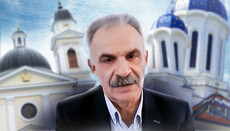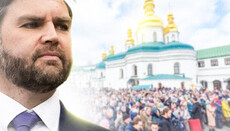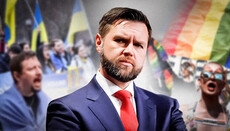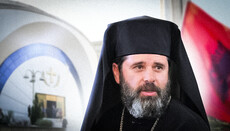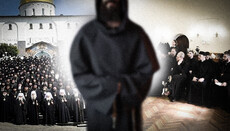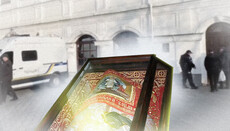What are the consequences of the Chaplaincy Law
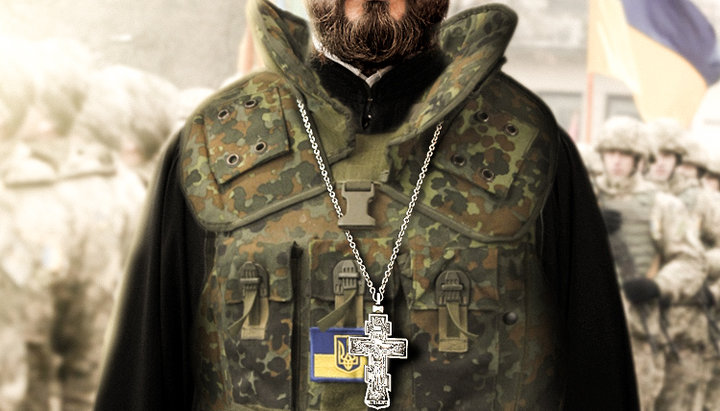
With the largest number of UOC parishioners in the army, there are almost no UOC chaplains in the UAF. Why are the rights of UOC believers so flagrantly violated?
On September 23, a draft law “On Military Chaplaincy in the Armed Forces of Ukraine” was submitted to the Verkhovna Rada of Ukraine. Attempts to legislatively regulate the activities of chaplains in the army have been carried out more than once and have encountered serious difficulties due to the need to balance the interests of the state and religious organizations. For the Ukrainian Orthodox Church, this issue is especially important since it is the UOC that is being ousted from many spheres of public and state life and, in particular, from the Armed Forces. What are the consequences of the current chaplaincy bill? Let's figure it out.
This article will not discuss in detail the questions of how the chaplain service will be organized, its financial and material provision, etc. We will only touch upon what causes the greatest fears for the rights and freedoms of believers and for the activities of the UOC in the army.
Both religious organizations and the state agree that it is necessary to have a priest in the army (and even more so participating in hostilities. But at the same time, they set different tasks for such priests and chaplains and expect different results from their activities.
The priest’s task in the army
The goal of the Church’s activity everywhere and in the army, in particular, is to unite people with God.
St. Tikhon of Zadonsk wrote: “As a hospital for the sick is the Holy Church for Christians who are spiritually sick. Patients enter the hospital through the door; the sick spiritually enter the Holy Church through faith and the Holy Baptism. The sick go to hospital to be healed from the disease and become healthy; the sick spiritually enter the Holy Church to be healed from mental illnesses and thus be saved. In the hospital, there is a doctor who visits, examines and treats patients; in the Holy Church, the Doctor is Christ, Who visits and heals Christians who are spiritually sick."
Our Lord Jesus Christ does this through bishops and priests ordained by the Holy Spirit. The life of a Christian takes place in the Church, that is in close communion with priests. And this communion should continue even when a Christian goes to serve in the army. More precisely, in the army, this communion should be especially close. After all, the service is a particularly difficult experience when there is a danger to life, when you need to show special courage, when the innermost qualities of a person come to the surface, unknown, perhaps, for himself in a quiet civilian life. And then a person especially needs communion with a priest, receiving from him the Grace of God in the Sacraments, spiritual strengthening and guidance.
Military actions imply the possibility of injury to a person or his death, and it is extremely important for his afterlife that a priest is nearby, and in such difficult and, perhaps, last minutes of life, a person could repent and accept the last parting word before passing on to another life.
But the purpose of such communion, the purpose of life in the Church does not change, it remains the same: the salvation of the soul, the unity of man with God. Military actions imply the possibility of injury to a person or his death, and it is extremely important for his afterlife that a priest is nearby, and in such difficult and, perhaps, last minutes of life, a person could repent and accept the last parting word before passing on to another life. After all, once again, the salvation of the soul of a serviceman is the main goal of the Church.
What does the army expect from a priest?
What are the purpose of the state and, accordingly, its expectations from the activity of chaplains? It is to improve the combat efficiency of the army, the morale of the servicemen and, ultimately, the effective performance of the tasks facing the Armed Forces. And this goal is achieved through "meeting religious needs", psychological assistance, reviving a sense of patriotism, the religious motivation of the servicemen while performing their duties.
This difference in understanding of chaplaincy is present in all countries, but in Ukraine, it is affected by our local specifics, namely: when P. Poroshenko was in power, an anti-UOC campaign was launched at the state level to discredit the Church and oust it from all spheres of public and state life, especially from the Armed Forces.
Today chaplaincy ministry is carried out by only one (!) priest of the UOC. The rest are representatives of the Orthodox Church of Ukraine (over 50%), Greek Catholics (about 30%) and other denominations.
Unfortunately, such a policy, in many ways, is still present today. If three years ago we could say that priests of the UOC are present in the Ukrainian army on an equal footing with other denominations, today only one (!) priest of the UOC, deputy head of the Synodal Department for Interaction with the Armed Forces, Archpriest Viacheslav Yakovenko, carries out chaplain service. The rest are representatives of the Orthodox Church of Ukraine (over 50%), Greek Catholics (about 30%) and other denominations. Since there are no legal prohibitions on the service of UOC priests in the army, the military leadership argues that there are no UOC believers among the military, and therefore there is no need to attract UOC priests.
This is obviously not true.
Even such a сommitted (to the OCU) sociological service as the 'Razumkov Centre' shows the results of a survey (end 2019), according to which 10.6% of respondents identify themselves as UOC believers (the OCU – 13.2%; the UOC-KP – 7.7%). If we extrapolate this figure to the personnel of the Armed Forces, which is about 250 thousand people (data from public sources), it turns out that there are 25 thousand soldiers and officers who need spiritual care of the UOC. The real figures, however, are probably much higher.
There are a lot of UOC believers in the army. This is evident by the fact that young people who are going to the army, come en masse to UOC churches for the blessing of service and prayers for their health. And common sense suggests that it does not happen so that a denomination numbering more than 12.8 thousand communities throughout Ukraine would have no one serving in the army. Let us think about this figure: almost 13 thousand parishes across the country and one chaplain in the army! Such outright discrimination against the UOC in the army is shocking.
Think of this figure: almost 13 thousand parishes across the country and one chaplain in the army! Such outright discrimination against the UOC in the army is shocking.
Archimandrite Luke (Vinarchuk), Deputy Chairman of the Synodal Department of the Ukrainian Orthodox Church for Interaction with the Armed Forces and Other Military Formations of Ukraine, says about it this way: “Both in the army and in other power structures, there are a large number of children of the Ukrainian Orthodox Church who are deprived of spiritual care. To date, almost all chaplaincy positions have been given either to representatives of the OCU or to the Uniates. There are even more Baptist pastors in the army than UOC priests, who are only one. On this basis, it is acceptable to raise the problem in this way: if the state calls on its citizens to fulfil their duty to their homeland but deprives them of their legal right to religious freedom, then let it cancel the call of those whose rights will be deliberately violated."
Will the new law reinforce discrimination against UOC believers in the army?
For now, bill 4148 "On Military Chaplaincy in the Armed Forces of Ukraine", which may bring the legal framework for such discrimination, is being introduced in the Verkhovna Rada. What is it about?
First, it is the creation of a vertically subordinate structure of the chaplaincy service. All chaplains, who are in the Armed Forces under an employment contract and receive remuneration from the state budget for this, are part of a single structure of the chaplain service, regardless of their religion. According to Article 6 of the draft law: "The military clergy service (chaplain service) in the Armed Forces of Ukraine is composed of:
- A structural subdivision (officials) of the Department of Military Education, Science, Social and Humanitarian Policy of the Ministry of Defence of Ukraine.
- Structural subdivisions (officials) of the Directorate General for Moral and Psychological Support of the Armed Forces of Ukraine and Military Command Bodies of the Armed Forces of Ukraine.
- A structural subdivision (officials) of the Centre for Moral and Psychological Support of the Armed Forces of Ukraine.
- Military priests (chaplains) of military units, military educational institutions, institutions and organizations of the Armed Forces of Ukraine (hereinafter – military units), other military formations".
It should be noted that despite the fact that one of the principles of chaplain's service is "non-interference of command and servicemen (personnel) of military units (subdivisions) in the professional activities of military chaplains" (Article 5), this principle is offset by the possibility of structural units of the Armed Forces mentioned above to influence the army priests.
If the state calls on its citizens to fulfill their duty to their homeland but deprives them of their legal right to religious freedom, then let it cancel the call of those whose rights will be deliberately violated.
Archimandrite Luke
For example, the organization and conduct of pastoral care activities are entrusted to officials of the Directorate General for Moral and Psychological Support of the Armed Forces of Ukraine and Military Command Bodies of the Armed Forces of Ukraine. And officials of the Centre for Moral and Psychological Support of the Armed Forces of Ukraine take part in activities for the pastoral care of personnel. Due to the fact that their powers are not clearly spelt out, these provisions of the draft law create the possibility of abuse, monitoring the activities of chaplains and creating obstacles to such activities.
Secondly, it is a categorical prohibition for the church hierarchy to control the military priest and influence his activities. Art. 20 of the bill reads: "Religious organizations and their representatives are prohibited from any direct or indirect interference in the activities of military chaplains <...> Those guilty of such interference <...> bear disciplinary, administrative or criminal responsibility ...." This position effectively removes the chaplain from the hierarchy of his denomination and subordinates him to the military leadership. Art. 15 of the bill directly says about this: "The military chaplain (military reserve chaplain) is subordinate to the commander of his military unit (subdivision) within the limits of his duties."
This is a clear violation of both the Constitution and the Law “On Freedom of Conscience”, as well as the canon law of the Church.
Thirdly, it is the provision that the army command rather than the servicemen themselves should decide whether they need chaplains of the UOC or not. Thus, the bill provides for the Department of Military Education, Science, Social and Humanitarian Policy of the Ministry of Defence to "order sociological surveys to ensure the implementation of the right to freedom of ideology and religion in the Ministry of Defence of Ukraine and the Armed Forces of Ukraine" (Article 6). As you know, sociological services in Ukraine conduct surveys in such a way that their results are liked by customers as much as possible.
The head of the Legal Department of the UOC, Archpriest Alexander Bakhov, said in one of his interviews how this happens in reality: “They have an 'anonymous' voting system in their units. In fact, they arrange the personnel and ask the question: “Do you want to go to the ‘Church of the Moscow Patriarchate?’” Do you think that after the question is raised in this way, there will be many who want to be ridiculed, bullied and prejudiced by the administration?”
If the bill is passed by the Verkhovna Rada in this form, then discrimination against UOC priests, as well as believing soldiers and officers, will be legalized, and the SBU and the military leadership will receive all the necessary levers of pressure on the chaplains.
Fourthly, it is the coordination of the candidacies of chaplains with the SBU and the military leadership. Art. 8 of the draft law stipulates: "Candidates of persons recruited for the post of a military priest (chaplain) must be agreed with the bodies of the Security Service of Ukraine (the Central Directorate or regional bodies of the Security Service of Ukraine, military counterintelligence bodies)." This provision can be effectively used to recruit future secret service chaplains, to control their activities and also put pressure on them. In addition, Art. 6 of the bill provides for the Department of Military Education, Science, Social and Humanitarian Policy of the Ministry of Defence, as well as the Directorate General for Moral and Psychological Support of the Armed Forces of Ukraine to participate "... in the selection and appointment of military chaplains (chaplains)".
It may be concluded that if the draft law is passed by the Verkhovna Rada in this form, then discrimination against UOC priests, as well as believing soldiers and officers, will be legalized, and the SBU and the military leadership will receive all the necessary levers of pressure on the chaplains. And returning to the different tasks (described above) that the Church and the state set for chaplains, we can say that the bill as a whole is aimed precisely at fulfilling the tasks of the state, in many respects turning the chaplains into a kind of political instructors who existed in the army in the Soviet Union.
